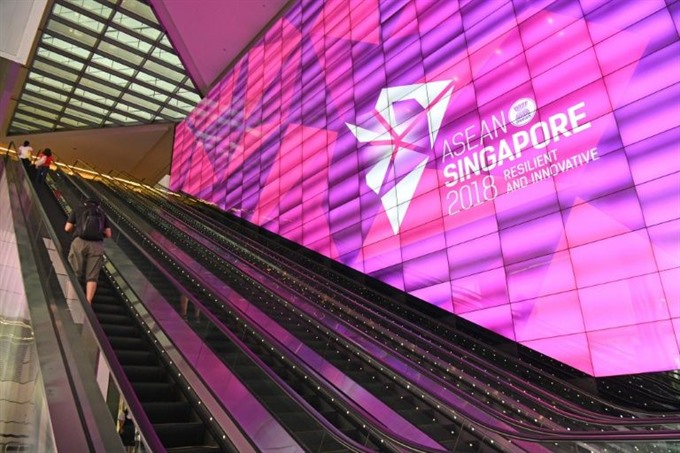 World
World

A China-backed bid to complete the world's largest trade deal -- without the United States -- was pushed back to next year after Asia-Pacific trade ministers failed to agree key terms at a Singapore summit.
 |
| The ASEAN summit, which formally opens in Singapore on Tuesday afternoon, is expected to sweep in trade, maritime disputes. — AFP/VNA Photo |
SINGAPORE — A China-backed bid to complete the world’s largest trade deal -- without the United States -- was pushed back to next year after Asia-Pacific trade ministers failed to agree key terms at a Singapore summit.
The Regional Comprehensive Economic Partnership (RCEP), covering half the world’s population, is billed as an antidote to Donald Trump’s "America First" agenda, which has seen tariffs imposed on almost half of all Chinese imports to the US -- and retaliatory levies by Beijing.
Chinese Premier Li Keqiang is in Singapore to give impetus to the deal on the sidelines of a gathering of Southeast Asian and world leaders.
But trade diplomats late Monday indicated negotiations on the RCEP, a sweeping 16-country deal that includes China, Japan, India and the 10 members of ASEAN (Association of Southeast Asian Nations), will carry on deep into 2019.
"We made significant progress, (but it) is not the final conclusion," New Zealand Minister of State for Trade and Export Growth Damien O’Connor told reporters late on Monday.
"But we are very happy with that and is heading in the right direction, hopefully ready for conclusion next year."
India’s concerns over opening its markets, in particular to Chinese firms, has been a key sticking point in the five years of negotiations.
"The future lies in RCEP," Indian trade minister Suresh Prabhu told reporters, but urged a cautious and patient approach to talks to ensure "every country will benefit from it".
Several general elections scheduled early next year including in India, Thailand and Indonesia have complicated the timeframe of a deal that will open markets in countries covering nearly half the world’s GDP.
A draft leaders’ statement on the RCEP seen by AFP said talks will be concluded next year, noting the urgency of reaching an agreement "given the current headwinds faced by the global economy".
RCEP was given extra impetus after Trump pulled the US out of rival pact the Trans-Pacific Partnership (TPP). The TPP is still alive even without Washington, but RCEP is now the world’s biggest trade deal.
However, the Beijing-backed pact is much less ambitious than the TPP in areas such as employment and environmental protection.
The ASEAN summit, which formally opens on Tuesday afternoon, is expected to sweep in trade, maritime disputes and the Rohingya crisis.
Key world leaders including China’s Li, Russian President Vladimir Putin and Mike Pence -- Donald Trump’s number two -- are also in Singapore for talks foreshadowed by the China-US trade war and its ripple effect on global economies, particularly in Asia.
Pence is also expected to keep pressure on Beijing over its growing aggression in the South China Sea. — AFP




